
Agility has become a cornerstone of modern business practices, transforming how organizations operate in an increasingly dynamic and competitive environment. From tech startups to global enterprises, adopting agile principles is no longer a luxury but a necessity to stay ahead. Yet, while understanding agility is crucial, validating your expertise through Agile certifications can set you apart in a crowded marketplace.
Certified professionals bring recognized credibility to their teams and organizations, often securing better career opportunities and higher salaries. But with the plethora of agile certifications available today, how do you choose the one that aligns with your career goals and professional needs?
This article aims to demystify the world of agile certifications by comparing six of the most recognized credentials in the field. Whether you are a budding Scrum Master, an experienced Agile Coach, or a leader looking to scale agility across an enterprise, this guide will help you navigate your options and make an informed decision.
We’ll explore each certification’s unique value proposition, the skillsets they emphasize, and their relevance in today’s job market. Along the way, we’ll provide data-backed insights, real-world testimonials, and practical advice to help you choose the path that best suits your aspirations.
By the end of this article, you’ll not only understand the benefits of certifications like CSM, SAFe Agilist, and Lean Kanban Professional but also feel inspired to take the next step toward mastering agility. Let’s embark on this journey together to unlock the potential that agile certifications hold for your career and your organization.
Introduction to Agile Certifications
Agile certifications are more than just credentials; they are gateways to professional growth, organizational trust, and mastery of frameworks that empower teams to deliver value efficiently. Before diving into the specifics of the top certifications, it’s essential to understand what agile certifications represent and why they are critical in today’s fast-evolving landscape.
1. What is an Agile Certification?
An agile certification is an official recognition that validates your knowledge and skills in agile principles, practices, and frameworks. It demonstrates your ability to effectively apply agile methodologies, whether in software development, project management, or broader organizational transformations.
These certifications typically cover one or more agile frameworks—like Scrum, Kanban, or SAFe—and offer practical insights into how to lead teams, manage projects, and adapt processes in dynamic environments.
2. Why Are There So Many Agile Certifications?
The diversity of agile certifications stems from the variety of methodologies and use cases within agility. Agile isn’t a one-size-fits-all approach; it’s a collection of practices designed to solve unique challenges.
For instance:
- Scrum focuses on iterative and incremental delivery, making it ideal for teams managing complex projects.
- Kanban emphasizes flow and visualization, suitable for improving operational efficiency.
- SAFe caters to enterprises scaling agile practices across large teams.
This variety means professionals and organizations can select certifications that align closely with their goals, industries, and challenges.
3. Why Pursue an Agile Certification?
The demand for agile-certified professionals continues to rise. According to the State of Agile Report, over 70% of organizations worldwide have adopted agile practices, leading to an increased need for individuals who can implement and lead these transformations effectively.
Here are the primary reasons to pursue an agile certification:
- Career Advancement: Certified professionals are often preferred by recruiters and earn higher salaries. For example, a Scrum Master with certification typically earns 10-20% more than their uncertified counterparts.
- Credibility and Trust: A certification showcases your expertise and boosts your credibility with peers, managers, and clients.
- Practical Application: Certifications provide structured learning and practical tools to address real-world challenges.
- Adaptability Across Roles: Whether you are a developer, project manager, or executive, agile certifications are designed to fit diverse professional paths.
4. Who Should Consider Agile Certification?
Agile certifications are not limited to project managers or IT professionals. Here’s a quick breakdown of roles that benefit from certification:
- Team Leaders and Scrum Masters: To guide and facilitate agile teams effectively.
- Project Managers: To transition from traditional methodologies like Waterfall to agile.
- Developers and QA Specialists: To better align with agile workflows.
- Product Owners: To enhance skills in backlog management and stakeholder collaboration.
- Executives and Managers: To scale agile practices across departments or the entire organization.
5. Key Benefits of Agile Certification for Organizations
Organizations also stand to gain significantly when their employees are certified:
- Improved Team Performance: Certified professionals bring proven frameworks and best practices to the table.
- Faster Time-to-Market: Agile-certified teams can deliver value incrementally, reducing time wasted on rework or misalignment.
- Better Customer Satisfaction: Agility fosters continuous feedback loops, leading to products that better meet customer needs.
- Scalability: Certifications like SAFe enable companies to apply agility at scale, even in complex environments.
Overview of the Top 6 Agile Certifications
The agile landscape is rich with certifications, each designed to address specific frameworks, skillsets, and professional aspirations. In this section, we’ll introduce the six most recognized agile certifications and highlight their unique focus areas. These certifications have been chosen for their global recognition, relevance in the industry, and ability to equip professionals with essential tools for success.
1. Certified ScrumMaster (CSM) – Scrum Alliance
The Certified ScrumMaster (CSM) is one of the most popular and widely recognized agile certifications globally. Offered by Scrum Alliance, it is specifically designed for individuals looking to master the Scrum framework.
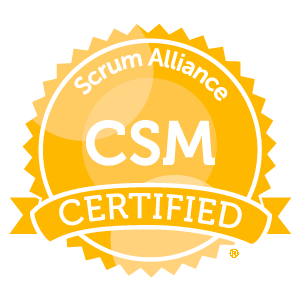
- Focus: Emphasizes the role of a Scrum Master in facilitating teams and ensuring Scrum practices are followed.
- Who It’s For: Ideal for aspiring Scrum Masters, team leaders, and project managers transitioning to Scrum.
- Format: Requires a two-day training course followed by an online certification exam.
- Recognition: Known for its broad acceptance in the job market.
- Key Advantage: A foundational certification for beginners seeking to understand and implement Scrum effectively.
Read more about Certified Scrum Master
2. Professional Scrum Master (PSM) – Scrum.org
The Professional Scrum Master (PSM) certification, offered by Scrum.org, is another highly sought-after credential focusing on the Scrum framework. It is often compared to the CSM but offers a more rigorous testing process.
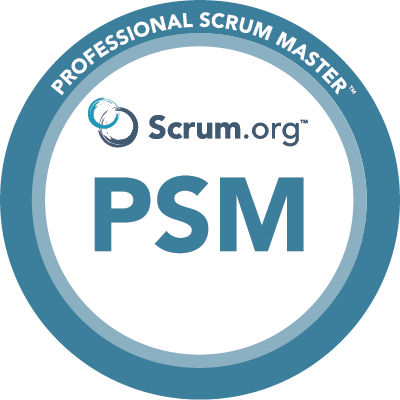
- Focus: Tests a deeper understanding of Scrum principles and practical application in real-world scenarios.
- Who It’s For: Professionals who already have some experience with Scrum or want a more challenging certification process.
- Format: No mandatory training; candidates can prepare independently and take the online exam.
- Recognition: Valued for its emphasis on critical thinking and problem-solving.
- Key Advantage: A cost-effective option for experienced professionals who prefer self-study.
3. SAFe Agilist (SA) – Scaled Agile Framework
The SAFe Agilist (SA) certification is designed for professionals working in large organizations that need to implement agile practices at scale. Offered by Scaled Agile, Inc., it focuses on enterprise agility.
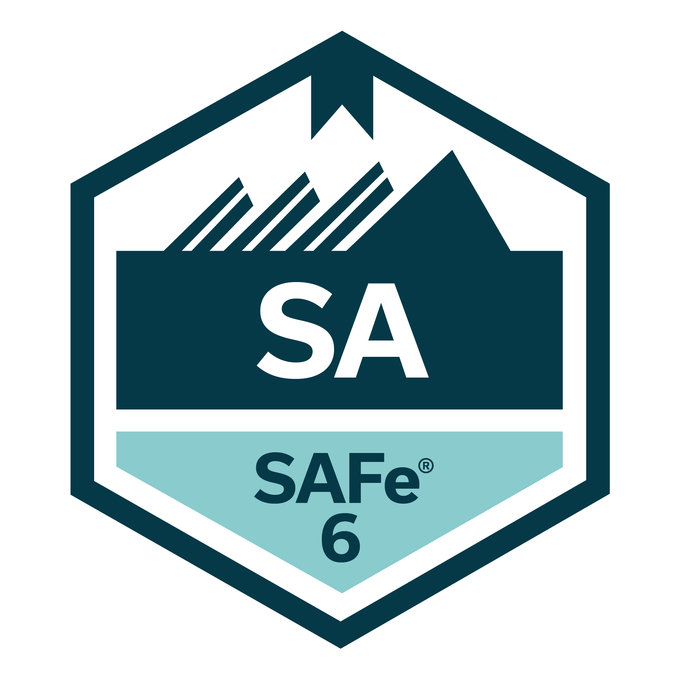
- Focus: Scaling agility across teams, departments, and entire organizations using the SAFe framework.
- Who It’s For: Executives, managers, and team leads responsible for agile transformations at the enterprise level.
- Format: Requires a two-day training course and a certification exam.
- Recognition: A must-have for roles in organizations adopting SAFe.
- Key Advantage: Provides the tools and techniques necessary for implementing agility in complex, multi-team environments.
4. ICAgile Certified Professional (ICP) – ICAgile
The ICAgile Certified Professional (ICP) certification is a versatile credential focusing on foundational agile concepts. Offered by ICAgile, it is designed to provide flexibility in learning and application.
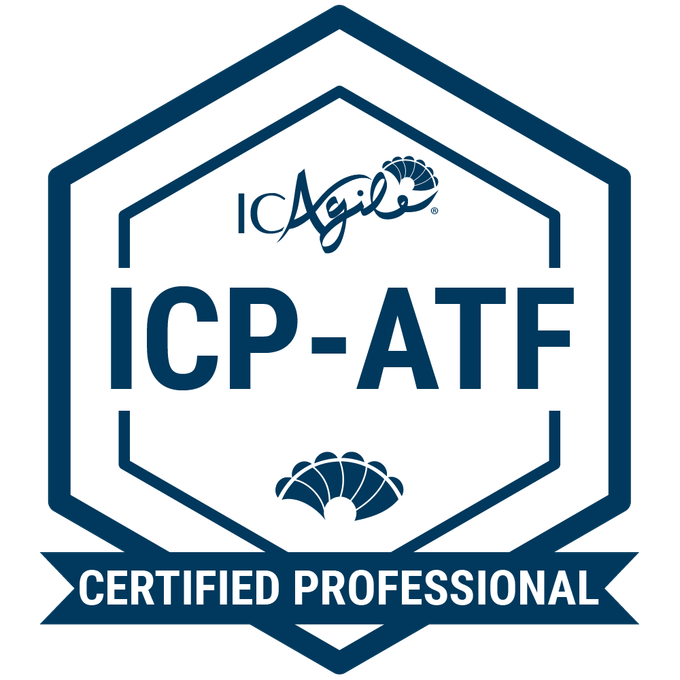
- Focus: General agile principles with pathways to specialize in areas like Agile Coaching, DevOps, and Agile Leadership.
- Who It’s For: Professionals at any level who want to build a strong foundation in agility.
- Format: Training provided by accredited partners; no standardized exam.
- Recognition: Known for its learning-oriented approach rather than exam-focused evaluation.
- Key Advantage: Offers multiple pathways to specialize in different domains of agility.
5. Disciplined Agile (DA) – PMI
The Disciplined Agile (DA) certification, offered by the Project Management Institute (PMI), emphasizes flexibility and context-driven agility. It introduces the Disciplined Agile Delivery (DAD) framework.
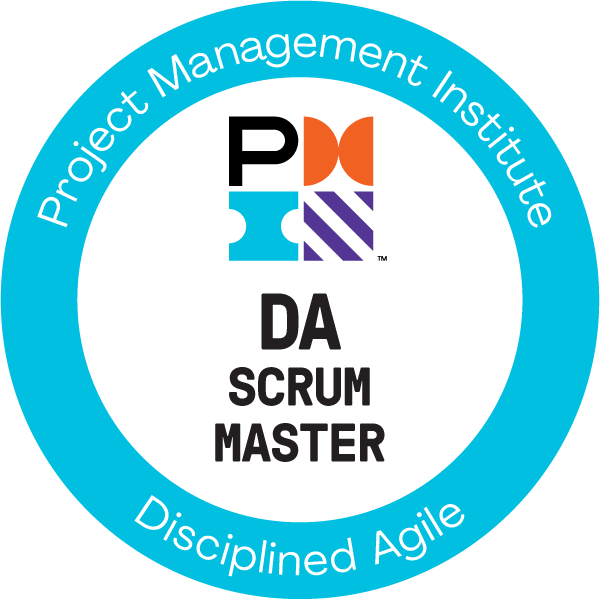
- Focus: Tailoring agile approaches to fit the unique needs of projects and organizations.
- Who It’s For: Project managers, Agile Coaches, and team leaders seeking adaptable solutions.
- Format: Training and certification exams, with various levels (e.g., DA Scrum Master, DA Senior Scrum Master).
- Recognition: Highly valued in project management communities.
- Key Advantage: Integrates well with other PMI certifications, like PMP, for a holistic project management approach.
6. Lean Kanban Management Professional (KMP) – Kanban University
The Lean Kanban Management Professional (KMP) certification is perfect for professionals focused on improving flow and efficiency using Kanban principles.
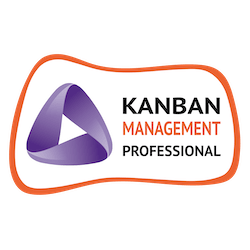
- Focus: Implementation of Kanban to manage workflows and optimize delivery systems.
- Who It’s For: Team members and managers in operational or development roles aiming to enhance efficiency.
- Format: Two levels of certification (KMP1 and KMP2), requiring training courses with accredited trainers.
- Recognition: Highly regarded in industries prioritizing operational excellence.
- Key Advantage: Practical and hands-on, making it ideal for those seeking immediate workplace improvements.
Detailed Comparison of the Top Agile Certifications
Choosing the right agile certification can be challenging without a clear understanding of their differences. This section provides an in-depth comparison of the six leading certifications, examining their structure, costs, target audience, and the unique benefits they bring to professionals and organizations.
1. Certified ScrumMaster (CSM) – Scrum Alliance
- Structure and Requirements:
- To obtain the CSM certification, candidates must complete a two-day training course from a Scrum Alliance Certified Trainer. The course covers the fundamentals of Scrum, the role of the Scrum Master, and techniques for team facilitation. After the training, participants take an online test with a passing score of 74%.
- Cost: The cost typically ranges from $800 to $1,500, depending on the training provider.
- Target Audience: Beginners in Scrum, project managers transitioning to agile, and aspiring Scrum Masters.
- Validity and Renewal: Certification is valid for two years and requires renewal by earning Scrum Education Units (SEUs).
- Key Benefit: Provides an excellent foundation in Scrum for professionals new to agile methodologies.
2. Professional Scrum Master (PSM) – Scrum.org
- Structure and Requirements:
- Unlike the CSM, the PSM certification does not mandate a training course. Candidates can self-study or attend a course offered by Scrum.org trainers. The PSM assessment (Level 1) is known for its difficulty and requires a strong understanding of Scrum theory and application.
- Cost: The PSM I exam costs $150, making it a budget-friendly option for self-learners.
- Target Audience: Experienced professionals familiar with Scrum and looking for a rigorous assessment of their skills.
- Validity and Renewal: The certification does not expire, which is a unique advantage over other certifications.
- Key Benefit: Known for its challenging nature, it establishes a higher level of credibility for Scrum practitioners.
3. SAFe Agilist (SA) – Scaled Agile Framework
- Structure and Requirements:
- Candidates must attend a two-day Leading SAFe course conducted by an accredited trainer. The course focuses on scaling agile practices across multiple teams and emphasizes SAFe principles, Lean-Agile leadership, and program execution. A 45-question online exam must be passed with a minimum score of 77%.
- Cost: Course fees typically range between $600 and $1,000, depending on the provider.
- Target Audience: Executives, managers, and team leaders responsible for driving agile transformations at scale.
- Validity and Renewal: Certification is valid for one year and requires annual renewal with membership fees.
- Key Benefit: Essential for professionals working in large enterprises or those involved in scaling agile practices.
4. ICAgile Certified Professional (ICP) – ICAgile
- Structure and Requirements:
- The ICP certification emphasizes learning rather than testing. Participants attend training courses delivered by ICAgile-accredited providers. These courses are tailored to specific agile domains, such as Agile Coaching, DevOps, or Business Agility.
- Cost: Training costs vary widely, typically ranging from $800 to $2,000 based on the course and specialization.
- Target Audience: Professionals at any level, from beginners to experts, looking to develop a tailored skillset.
- Validity and Renewal: The certification does not expire, making it a one-time investment.
- Key Benefit: Flexible pathways for specialization in various agile practices and domains.
5. Disciplined Agile (DA) – PMI
- Structure and Requirements:
- The DA certification program includes several levels, starting with DA Scrum Master (DASM) and progressing to more advanced credentials like DA Coach (DAC). Candidates must attend a training course followed by an exam. The curriculum focuses on tailoring agile practices to fit project-specific needs.
- Cost: Training and exam costs typically range between $600 and $1,200, depending on the certification level.
- Target Audience: Agile practitioners, project managers, and leaders seeking customizable solutions for agility.
- Validity and Renewal: Certification is valid for three years and requires renewal by earning Professional Development Units (PDUs).
- Key Benefit: Adaptability to diverse industries and project requirements makes it a standout choice for complex environments.
6. Lean Kanban Management Professional (KMP) – Kanban University
- Structure and Requirements:
- The KMP certification consists of two levels: KMP1 (Kanban System Design) and KMP2 (Kanban Management Professional). Candidates must attend training workshops focused on practical Kanban implementation. No formal exam is required.
- Cost: Course fees typically range from $1,200 to $2,000 for both levels.
- Target Audience: Professionals in operational roles, project managers, and anyone aiming to improve workflow efficiency.
- Validity and Renewal: Certification does not expire, offering a one-time investment for lifelong credibility.
- Key Benefit: Highly practical, making it ideal for immediate application in workplace processes.
Comparison Summary
| Certification | Cost | Target Audience | Renewal | Key Focus |
|---|---|---|---|---|
| Certified ScrumMaster | $800-$1,500 | Beginners, Scrum Masters | Every 2 years | Foundational Scrum principles |
| Professional Scrum Master | $150 | Experienced Scrum practitioners | No renewal | Rigorous testing of Scrum knowledge |
| SAFe Agilist | $600-$1,000 | Executives, managers | Every year | Scaling agile in enterprises |
| ICAgile Certified Pro. | $800-$2,000 | General agile practitioners | No renewal | Learning and specialization |
| Disciplined Agile | $600-$1,200 | Agile leaders, project managers | Every 3 years | Customizable agile frameworks |
| Lean Kanban (KMP) | $1,200-$2,000 | Workflow managers, operational roles | No renewal | Kanban system design and efficiency |
How to Choose the Right Agile Certification for You

Selecting the best agile certification can feel overwhelming, especially with the variety of options available. However, by evaluating your career goals, professional context, and learning preferences, you can identify the certification that aligns perfectly with your needs. Below, we outline practical steps and considerations to help you make an informed choice.
1. Define Your Career Objectives
Understanding your professional aspirations is the first step in choosing an agile certification. Ask yourself:
- Are you just starting your agile journey?
- If you’re new to agile, certifications like Certified ScrumMaster (CSM) or ICAgile Certified Professional (ICP) provide foundational knowledge and practical guidance.
- Do you want to deepen your expertise in Scrum?
- Experienced Scrum practitioners may prefer the more rigorous Professional Scrum Master (PSM) certification.
- Are you aiming for leadership or coaching roles?
- Certifications like SAFe Agilist (SA) or Disciplined Agile (DA) are designed for scaling agility and leading organizational transformations.
- Are you focused on improving operational efficiency?
- If workflow management and process optimization are your priorities, the Lean Kanban Management Professional (KMP) certification is ideal.
Clearly defining your career goals will narrow down the options and guide your decision.
2. Consider Your Current Role and Responsibilities
Your current job role and responsibilities can also influence your certification choice. For example:
- Team Members: Roles like developers, testers, or designers benefit from certifications that focus on team-level practices, such as CSM or PSM.
- Team Leaders and Scrum Masters: Certifications like PSM or SAFe Agilist equip leaders with advanced facilitation and scaling techniques.
- Project Managers and Executives: Certifications such as Disciplined Agile (DA) or SAFe Agilist are tailored to professionals managing multiple teams or overseeing agile transformations.
- Operational Managers: For roles that involve workflow management, Lean Kanban (KMP) offers practical tools for immediate implementation.
Aligning your certification with your current role ensures the skills you acquire are immediately applicable.
3. Evaluate the Needs of Your Organization
Your organization’s level of agile adoption and specific needs can significantly impact your choice of certification. Here’s how:
- For Small or Agile-Ready Teams:
- CSM or PSM are ideal for organizations already familiar with agile practices or operating in small teams.
- For Large Enterprises Scaling Agility:
- SAFe Agilist is highly effective for scaling agile practices across departments and teams.
- For Organizations Focused on Efficiency:
- Lean Kanban (KMP) helps streamline workflows and optimize processes.
- For Diverse and Dynamic Environments:
- Disciplined Agile (DA) provides the flexibility to tailor agile approaches to fit unique contexts.
Choosing a certification that aligns with your organization’s goals can boost its overall agility and drive better outcomes.
4. Assess Your Learning Style and Budget
Your personal preferences and financial considerations also play a significant role. Here’s how to weigh these factors:
- Learning Style:
- Do you prefer structured learning? Certifications like CSM and SAFe Agilist require classroom or virtual training.
- Are you comfortable with self-study? PSM offers flexibility for independent learners.
- Do you want a hands-on approach? Certifications like KMP involve practical workshops and real-world exercises.
- Budget:
- If cost is a concern, certifications like PSM ($150) are more affordable than others like KMP or Disciplined Agile, which can cost upwards of $1,200.
- Consider long-term value: Certifications like PSM or ICP, which do not require renewal, may be more cost-effective over time.
Balancing your learning style with your budget ensures you choose a certification that fits your lifestyle and financial situation.
5. Think About Industry Recognition
The recognition of a certification within your industry or geographic region is another key factor:
- Global Recognition: Certifications like CSM and SAFe Agilist are widely recognized and respected worldwide.
- Regional or Sector-Specific Value: Some certifications, like Lean Kanban (KMP), may have higher demand in specific industries such as manufacturing or IT operations.
- Emerging Trends: Certifications like Disciplined Agile (DA) are gaining popularity as organizations seek more flexible approaches to agility.
Research the certifications most valued in your industry or by your prospective employers to maximize your career potential.
6. Explore Testimonials and Success Stories
Learning from others’ experiences can offer valuable insights. Here are some ways to gather information:
- Ask Certified Professionals: Reach out to colleagues or industry peers who hold the certifications you’re considering. Ask how the certification has impacted their career.
- Review Case Studies: Look for success stories from organizations or individuals who benefited from specific certifications.
- Join Agile Communities: Online forums, LinkedIn groups, or Scrum user groups can provide firsthand accounts and advice.
Real-world experiences can help you understand the practical value of a certification beyond its description.
7. Start Small and Build Over Time
If you’re unsure where to start, choose an entry-level certification and build your expertise progressively. For instance:
- Begin with CSM or ICP to establish a foundation in agile practices.
- Advance to PSM or SAFe Agilist to deepen your expertise.
- Explore specialized certifications like KMP or Disciplined Agile for targeted skills.
This incremental approach ensures continuous learning and career growth without overwhelming yourself.
Key Takeaway
Choosing the right agile certification is a personal decision that depends on your career goals, organizational needs, and learning preferences. By following these steps and carefully evaluating your options, you can confidently select a certification that propels your career forward while contributing value to your organization.
The Career and Organizational Impact of Agile Certifications
Agile certifications have proven to be transformative for both individuals and organizations. They not only open doors to career advancement but also enable teams and businesses to thrive in an ever-changing market landscape. This section explores the broader impact of agile certifications on career growth, team performance, and organizational success, as well as the trends shaping the future of agile certifications.
1. Career Benefits of Agile Certifications
Enhanced Employability
- Certified professionals are in high demand across industries adopting agile practices. According to the State of Agile Report, 72% of organizations worldwide use agile methods, creating a continuous demand for skilled practitioners.
- Recruiters often prioritize candidates with certifications like Certified ScrumMaster (CSM) or SAFe Agilist, as they demonstrate a verified understanding of agile principles.
Increased Salary Potential
- Agile certifications significantly impact earning potential. For example:
- Scrum Masters with CSM certification report salaries 10-20% higher than their uncertified peers.
- SAFe-certified professionals often qualify for senior leadership roles, with salaries that reflect their ability to manage complex agile ecosystems.
Broader Career Pathways
- Certifications provide flexibility to pursue diverse roles, such as:
- Scrum Master: Facilitating agile teams.
- Agile Coach: Mentoring organizations through agile transformations.
- Product Owner: Driving product vision and prioritizing work.
- Enterprise Agile Leader: Scaling agile practices across organizations.
Boosted Credibility and Confidence
- Certifications validate expertise, giving professionals the confidence to lead teams, propose solutions, and drive change.
- They also enhance peer recognition, establishing the certified individual as a trusted authority in their field.
2. Organizational Impact of Agile Certifications
Improved Team Performance
- Certified professionals bring structured frameworks and best practices to their teams. For example:
- Scrum-certified individuals excel at fostering collaboration and resolving team conflicts.
- Kanban-certified managers optimize workflows, leading to faster and more predictable delivery.
Accelerated Delivery of Value
- Agile-certified teams are better equipped to deliver value incrementally, reducing time-to-market.
- SAFe-certified organizations often report a 20-30% improvement in program-level delivery times by aligning multiple teams around shared objectives.
Higher Stakeholder Satisfaction
- Agile methodologies prioritize customer feedback, and certifications equip teams to implement this effectively. This leads to better-aligned products and services that satisfy stakeholders.
Scalability of Agile Practices
- Certifications like SAFe Agilist and Disciplined Agile provide the tools to scale agility across large organizations, ensuring consistency and alignment across teams.
Adaptation to Market Changes
- Certified professionals are trained to embrace change and prioritize continuous improvement, which helps organizations stay competitive in volatile markets.
3. Emerging Trends Shaping the Future of Agile Certifications
Focus on Soft Skills
- As agile practices mature, soft skills like leadership, emotional intelligence, and facilitation are becoming just as important as technical knowledge.
- Certifications like ICAgile’s Agile Coaching Track address this need, focusing on interpersonal and coaching skills.
Integration with New Technologies
- Agile certifications are evolving to include emerging technologies like DevOps, AI, and cloud computing. For instance, ICAgile offers specialized tracks for DevOps and technical agility.
Increased Emphasis on Business Agility
- Organizations are increasingly adopting business agility practices to extend agile principles beyond IT and into functions like marketing, HR, and finance. Certifications such as Disciplined Agile (DA) are well-suited to these broader applications.
Remote and Digital Learning Options
- With remote work becoming the norm, certification bodies are adapting by offering virtual training and online exams, making certifications more accessible worldwide.
Lifelong Learning and Continuous Certification
- Agile frameworks continue to evolve, and certifications are following suit. Renewal requirements for certifications like SAFe Agilist encourage professionals to stay updated with the latest practices and tools.
4. Why Invest in Agile Certifications Today?
Whether you’re an individual professional or an organization, the benefits of agile certifications extend beyond immediate gains:
- For Individuals:
- Unlock career opportunities in agile roles.
- Stay competitive in a rapidly changing job market.
- Gain a structured understanding of frameworks to confidently lead projects.
- For Organizations:
- Build high-performing teams with certified leaders.
- Achieve faster, customer-centric product deliveries.
- Enhance adaptability to market changes, ensuring long-term success.
Key Takeaway
Agile certifications are not merely badges of achievement; they are strategic tools for personal and organizational growth. They empower individuals to excel in their careers while enabling organizations to stay competitive in an agile world. As agile practices continue to evolve, certifications will remain essential for fostering innovation, adaptability, and excellence in every domain.
Future Perspectives of Agile Certifications
As agility continues to shape the way organizations operate, agile certifications are evolving to meet new challenges and demands. In this section, we’ll explore how these certifications are adapting to global trends and the opportunities they offer for future-proofing careers and businesses.
1. The Evolving Role of Agile Professionals
Broadening Agile’s Scope Beyond IT
Agile methodologies are no longer confined to software development or IT departments. Business agility is a growing trend where principles of agility are applied to areas like marketing, human resources, and finance.
- Certifications Leading the Way: Programs like Disciplined Agile (DA) and ICAgile Business Agility Foundations are tailored to professionals seeking to drive agility across entire organizations.
- Impact: This shift enables cross-functional teams to collaborate effectively, leading to innovation and faster responses to market changes.
Emphasis on Agile Leadership
The role of leadership is being redefined in the agile ecosystem. Leaders are expected to act as facilitators and enablers rather than traditional command-and-control figures.
- Emerging Certifications: Agile leadership certifications, such as SAFe Agilist and ICAgile’s Leading with Agility, emphasize the importance of fostering collaboration and empowering teams.
- Impact: These certifications prepare leaders to navigate the complexities of modern organizations while maintaining alignment with agile values.
2. Integration with Digital and Technological Trends
Agile in DevOps and Cloud Environments
As organizations adopt DevOps practices and cloud-based solutions, the need for agility in technical operations is growing.
- Specialized Certifications: ICAgile offers a DevOps Pathway, which bridges the gap between development and operations, ensuring seamless delivery pipelines.
- Impact: Professionals certified in these areas can drive efficiency and innovation in tech-heavy environments.
Focus on AI and Automation
Automation and artificial intelligence (AI) are reshaping agile workflows, from backlog management to data-driven decision-making.
- Emerging Trends: Certifications are increasingly incorporating tools and practices that integrate AI and automation into agile processes.
- Impact: Agile-certified professionals with knowledge of emerging technologies are better equipped to lead digital transformations.
3. Growing Demand for Agile Coaches and Change Agents
Agile Coaching as a Strategic Role
Organizations are recognizing the value of agile coaches as catalysts for cultural and operational transformation.
- Popular Pathways: Certifications like ICAgile Certified Agile Coaching and Enterprise Agile Coach provide in-depth knowledge of facilitation, mentoring, and organizational change.
- Impact: These roles are crucial in sustaining agility within organizations, ensuring continuous improvement and alignment with business goals.
Change Management Integration
The synergy between agile practices and change management is becoming a focal point, especially in large-scale transformations.
- Certifications of Interest: Programs like Disciplined Agile Coach and SAFe Program Consultant (SPC) combine change management principles with agile practices.
- Impact: Certified change agents play a vital role in ensuring smooth transitions during agile transformations.
4. Agile for Sustainability and Social Impact
Agility in the Context of Sustainability
As businesses prioritize sustainability, agile principles are being applied to address environmental and social challenges.
- Emerging Focus: Certifications and training programs are starting to include sustainability-oriented modules, helping organizations align their agile practices with broader ethical goals.
- Impact: Agile-certified professionals can contribute to initiatives that balance profitability with environmental and social responsibility.
Agile in Non-Traditional Sectors
Sectors like healthcare, education, and government are adopting agile frameworks to improve efficiency and responsiveness.
- Examples: ICAgile’s certifications in Agile for People and Teams are being tailored to address the unique needs of these sectors.
- Impact: Agile-certified individuals are driving innovation and better service delivery in areas critical to society.
5. Accessibility and Globalization of Certifications
Digital Learning and Certification
Remote learning and online certification exams are making agile certifications more accessible globally.
- Platforms: Providers like Scrum Alliance, Scrum.org, and ICAgile now offer virtual training and proctored online exams.
- Impact: Professionals from any region can enhance their skills without the barriers of travel or high costs.
Localized Certifications
As agility spreads globally, certification bodies are adapting to regional needs, offering content in multiple languages and addressing local market challenges.
- Impact: This inclusivity allows professionals worldwide to benefit from agile certifications that are relevant to their unique contexts.
6. Lifelong Learning in Agile
Continuous Certification and Professional Development
Many certifications now require ongoing education or renewal to keep professionals up-to-date with evolving practices.
- Examples:
- SAFe Agilist requires annual renewal.
- Disciplined Agile certifications encourage professionals to earn PDUs for continuous growth.
- Impact: This approach ensures certified individuals remain relevant and valuable to their organizations.
Evolving Specializations
As industries evolve, certification bodies are expanding their offerings to include emerging specializations like Agile Data Management or Agile Risk Management.
- Impact: Professionals can continue to diversify their skillsets and explore new career opportunities.
Key Takeaway
The future of agile certifications lies in their ability to adapt to new challenges, embrace emerging technologies, and expand their reach across industries. By staying ahead of these trends, certified professionals and organizations can maintain a competitive edge, drive innovation, and lead meaningful transformations.
Conclusion: Taking the First Step in Your Agile Certification Journey
Agile certifications are more than just credentials; they are powerful enablers of personal growth and organizational success. In a world that increasingly values adaptability, collaboration, and continuous improvement, earning an agile certification equips you with the tools to thrive and lead in dynamic environments.
1. Key Insights from This Guide
The Value of Agile Certifications
- Agile certifications validate your expertise, enhance your credibility, and open doors to exciting career opportunities.
- They empower you to implement frameworks that improve team performance, optimize workflows, and drive business outcomes.
Choosing the Right Certification
- The diversity of certifications, from CSM and PSM to SAFe Agilist and Lean Kanban Professional, ensures there is an option for every professional and organizational need.
- By evaluating your career goals, learning style, and organizational context, you can select the certification that aligns with your aspirations.
The Growing Role of Agility
- Agile principles are expanding beyond IT to industries like healthcare, education, and government, driving innovation and sustainability.
- Certifications are evolving to include emerging trends like business agility, AI integration, and agile coaching, keeping professionals at the forefront of the industry.
2. Why Act Now?
The demand for agile-certified professionals is higher than ever. According to industry reports, businesses that adopt agile practices see measurable improvements in delivery times, customer satisfaction, and team morale. By earning a certification, you position yourself as a valuable asset in this growing ecosystem.
Furthermore, certifications like SAFe Agilist or Disciplined Agile are becoming essential for leadership roles in scaling agility across enterprises. Starting your certification journey now ensures you stay competitive and relevant as the agile landscape evolves.
3. Actionable Steps to Begin Your Journey
Here are some practical steps to get started:
- Identify Your Goals: Reflect on your career aspirations and the roles you want to pursue. Use this guide to align your goals with the right certification.
- Research Certification Bodies: Visit websites of organizations like Scrum Alliance, Scrum.org, ICAgile, and Scaled Agile to explore course details and training providers.
- Plan Your Budget and Schedule: Consider the costs, time commitment, and training formats (in-person, virtual, or self-paced) that work best for you.
- Engage with Agile Communities: Join agile forums, LinkedIn groups, or local meetups to connect with professionals who can share their experiences and advice.
- Take the First Step: Enroll in an entry-level certification like CSM or ICP to build a strong foundation and gain confidence in your agile journey.
4. Final Words of Encouragement
Agility is not just a methodology; it’s a mindset that fosters resilience, innovation, and collaboration. By earning an agile certification, you’re not only investing in your career but also contributing to the success of your teams and organizations. Remember, the journey to mastering agility starts with a single step—and that step could be the decision you make today.
If you’re ready to embark on this transformative journey, the world of agility awaits. Start small, stay curious, and watch as the doors to new opportunities and achievements open before you.
Now it’s your turn: Which agile certification will you choose to take your career to the next level? Share your thoughts, questions, or experiences in the comments below. Let’s continue the conversation and grow together!